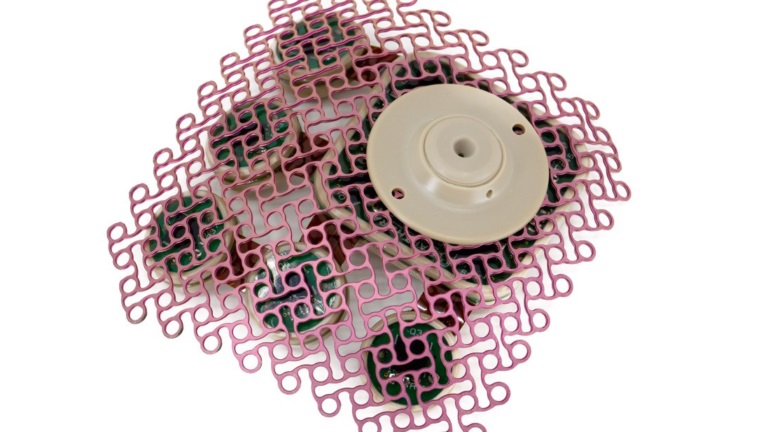Blood-Brain-Barrier Opening Device Enhances Chemotherapy Drug Delivery to Brain Tissue
|
By HospiMedica International staff writers Posted on 08 Feb 2024 |

The blood-brain barrier (BBB) presents a significant challenge in treating gliomas, a type of diffuse tumor that infiltrates the peri-tumoral normal brain. This barrier prevents over 95% of small-molecule drugs and all large-molecule drugs from entering the brain, thus reducing their therapeutic impact. Now, an implantable device utilizes the power of pulsed ultrasound to temporarily open the BBB. This provides a window period during which drug therapies can be administered and can reach the brain in higher and more effective concentrations when the BBB is disrupted.
Carthera’s (Lyon, France) SonoCloud device is designed to be implanted in a skull window beneath the skin, remaining invisible from the outside. When activated for a few minutes via a transdermal needle connected to an external control unit, the device employs low intensity pulsed ultrasound (LIPU) to breach the BBB for several hours. This window of opportunity allows for the administration of drug therapies. The concept of using LIPU to disrupt the BBB has been under pre-clinical development for over two decades. The technology leverages low-intensity ultrasound, akin to levels used in diagnostic imaging, in conjunction with an intravenous microbubble agent to stimulate a therapeutic effect. The LIPU causes the injected microbubbles in brain microvessels to vibrate, mechanically disrupting the BBB’s tight junctions, enhancing active transport across the BBB, and reducing active drug efflux transporters.
Carthera has developed multiple versions of the SonoCloud device, including SonoCloud-1 and SonoCloud-9. These MRI-compatible devices are engineered to disrupt large regions of the BBB, aiming to improve the therapeutic efficacy of drugs in specific brain areas. Currently, these devices are undergoing clinical trials for glioblastoma, brain metastases, and Alzheimer’s Disease. Carthera has initiated the SONOBIRD clinical trial, an open-label, comparative, randomized, multicenter study with a two-arm design and a 1:1 ratio. This trial will assess the overall survival of glioblastoma patients treated with carboplatin chemotherapy in conjunction with the SonoCloud-9 system to breach the BBB. Outcomes will be compared against standard regimens recommended by medical consensus, such as lomustine or temozolomide. Additionally, the trial aims to evaluate the effectiveness of the SonoCloud-9 and carboplatin treatment in delaying or reducing tumor growth.
“The launch of the SONOBIRD trial is a significant achievement in the clinical development of the SonoCloud-9 system. If the efficacy of carboplatin in combination with our device is proven, it will change the paradigm of how we treat glioblastoma,” said Carole Desseaux, chief clinical officer at Carthera
Latest Surgical Techniques News
- Intravascular Imaging for Guiding Stent Implantation Ensures Safer Stenting Procedures
- World's First AI Surgical Guidance Platform Allows Surgeons to Measure Success in Real-Time
- AI-Generated Synthetic Scarred Hearts Aid Atrial Fibrillation Treatment
- New Class of Bioadhesives to Connect Human Tissues to Long-Term Medical Implants
- New Transcatheter Valve Found Safe and Effective for Treating Aortic Regurgitation
- Minimally Invasive Valve Repair Reduces Hospitalizations in Severe Tricuspid Regurgitation Patients
- Tiny Robotic Tools Powered by Magnetic Fields to Enable Minimally Invasive Brain Surgery
- Magnetic Tweezers Make Robotic Surgery Safer and More Precise
- AI-Powered Surgical Planning Tool Improves Pre-Op Planning
- Novel Sensing System Restores Missing Sense of Touch in Minimally Invasive Surgery
- Headset-Based AR Navigation System Improves EVD Placement
- Higher Electrode Density Improves Epilepsy Surgery by Pinpointing Where Seizures Begin
- Open-Source Tool Optimizes Placement of Visual Brain Implants
- Easy-To-Apply Gel Could Prevent Formation of Post-Surgical Abdominal Adhesions
- Groundbreaking Leadless Pacemaker to Prevent Invasive Surgeries for Children
- Spectroscopy Technique Improves Surgery for Pediatric Epilepsy Patients
Channels
Critical Care
view channel
Ingestible Smart Capsule for Chemical Sensing in the Gut Moves Closer to Market
Intestinal gases are associated with several health conditions, including colon cancer, irritable bowel syndrome, and inflammatory bowel disease, and they have the potential to serve as crucial biomarkers... Read moreNovel Cannula Delivery System Enables Targeted Delivery of Imaging Agents and Drugs
Multiphoton microscopy has become an invaluable tool in neuroscience, allowing researchers to observe brain activity in real time with high-resolution imaging. A crucial aspect of many multiphoton microscopy... Read more
Novel Intrabronchial Method Delivers Cell Therapies in Critically Ill Patients on External Lung Support
Until now, administering cell therapies to patients on extracorporeal membrane oxygenation (ECMO)—a life-support system typically used for severe lung failure—has been nearly impossible.... Read morePatient Care
view channel
Portable Biosensor Platform to Reduce Hospital-Acquired Infections
Approximately 4 million patients in the European Union acquire healthcare-associated infections (HAIs) or nosocomial infections each year, with around 37,000 deaths directly resulting from these infections,... Read moreFirst-Of-Its-Kind Portable Germicidal Light Technology Disinfects High-Touch Clinical Surfaces in Seconds
Reducing healthcare-acquired infections (HAIs) remains a pressing issue within global healthcare systems. In the United States alone, 1.7 million patients contract HAIs annually, leading to approximately... Read more
Surgical Capacity Optimization Solution Helps Hospitals Boost OR Utilization
An innovative solution has the capability to transform surgical capacity utilization by targeting the root cause of surgical block time inefficiencies. Fujitsu Limited’s (Tokyo, Japan) Surgical Capacity... Read more
Game-Changing Innovation in Surgical Instrument Sterilization Significantly Improves OR Throughput
A groundbreaking innovation enables hospitals to significantly improve instrument processing time and throughput in operating rooms (ORs) and sterile processing departments. Turbett Surgical, Inc.... Read moreHealth IT
view channel
Printable Molecule-Selective Nanoparticles Enable Mass Production of Wearable Biosensors
The future of medicine is likely to focus on the personalization of healthcare—understanding exactly what an individual requires and delivering the appropriate combination of nutrients, metabolites, and... Read more
Smartwatches Could Detect Congestive Heart Failure
Diagnosing congestive heart failure (CHF) typically requires expensive and time-consuming imaging techniques like echocardiography, also known as cardiac ultrasound. Previously, detecting CHF by analyzing... Read moreBusiness
view channel
Expanded Collaboration to Transform OR Technology Through AI and Automation
The expansion of an existing collaboration between three leading companies aims to develop artificial intelligence (AI)-driven solutions for smart operating rooms with sophisticated monitoring and automation.... Read more
















